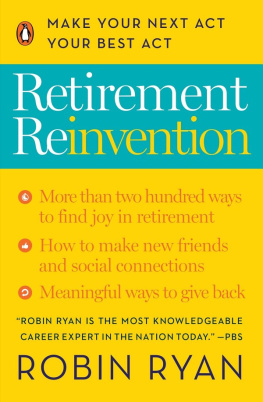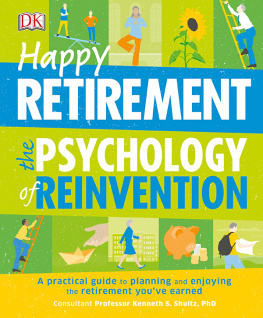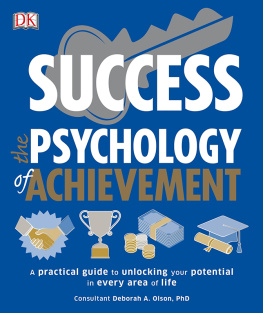Megan Kaye - Happy Retirement: The Psychology of Reinvention
Here you can read online Megan Kaye - Happy Retirement: The Psychology of Reinvention full text of the book (entire story) in english for free. Download pdf and epub, get meaning, cover and reviews about this ebook. year: 2016, publisher: DK Publishing, genre: Home and family. Description of the work, (preface) as well as reviews are available. Best literature library LitArk.com created for fans of good reading and offers a wide selection of genres:
Romance novel
Science fiction
Adventure
Detective
Science
History
Home and family
Prose
Art
Politics
Computer
Non-fiction
Religion
Business
Children
Humor
Choose a favorite category and find really read worthwhile books. Enjoy immersion in the world of imagination, feel the emotions of the characters or learn something new for yourself, make an fascinating discovery.

- Book:Happy Retirement: The Psychology of Reinvention
- Author:
- Publisher:DK Publishing
- Genre:
- Year:2016
- Rating:4 / 5
- Favourites:Add to favourites
- Your mark:
- 80
- 1
- 2
- 3
- 4
- 5
Happy Retirement: The Psychology of Reinvention: summary, description and annotation
We offer to read an annotation, description, summary or preface (depends on what the author of the book "Happy Retirement: The Psychology of Reinvention" wrote himself). If you haven't found the necessary information about the book — write in the comments, we will try to find it.
Megan Kaye: author's other books
Who wrote Happy Retirement: The Psychology of Reinvention? Find out the surname, the name of the author of the book and a list of all author's works by series.
Happy Retirement: The Psychology of Reinvention — read online for free the complete book (whole text) full work
Below is the text of the book, divided by pages. System saving the place of the last page read, allows you to conveniently read the book "Happy Retirement: The Psychology of Reinvention" online for free, without having to search again every time where you left off. Put a bookmark, and you can go to the page where you finished reading at any time.
Font size:
Interval:
Bookmark:
Happy Retirement: The Psychology of Reinvention is an inspirational, easy-to-use eBook, packed with practical advice that's grounded in psychological research.
The eBook is divided into six chapters and more than 80 topics that cover every stage of retirementfrom planning and approaching the big day, to transitioning to your new life and discovering ways to reinvent yourself.
To navigate through the eBook, use the built-in links on the contents page. These will take you to the relevant chapter or topic. Cross-references embedded in the text also link to related topics or features in other parts of the eBook.
Throughout the eBook you will find infographics, self-analysis questionnaires, charts, and tables that make the scientific findings easy to understand and apply to your life. Many of these will enlarge for easier reading when you double tap on them. To continue reading, simply close the image using the X in the top corner.
We suggest that this eBook looks best on most devices with the following settings:
- White background
- Serif font (e.g., Georgia)
- Scrolling view off
- Justified text alignment (if your eBook reader has this feature)
- Smallest point size (particularly when scanning through the eBook)
- Publisher default setting to be switched on (if your eBook reader has this feature)

A pproximately 25 years ago my father was offered an early retirement package at the age of 55. While physically he was ready to retire from a demanding job at the telephone company, psychologically he was not ready. I was just beginning my research career, and so my interest in the psychological aspects of the retirement process was piqued by my fathers experience. Much of the research on retirement at that time (in the early 1990s) was focused on health and wealth. That is, most economists believed that health and wealth were the driving forces behind the decision to retire. However, a quarter of a century later, and having published several books, book chapters, and numerous articles on the topic of the psychology of retirement since then, I am amazed at the dynamic nature of retirement in the 21st century, as well as the critical importance that psychological factors play in the transition to retirement.
Today retirement can take a number of different forms. This can include volunteer work, starting a second career, taking on the role of caregiver, or more likely, some combination of roles. Retirement has become a very individualized and personal journey for those making the transition from a career to that next phase of life.
Happy Retirement: The Psychology of Reinvention is ideal for anyone who is making the personal journey from full-time work to retirement. Every page is bursting with practical advice that, importantly, is based on a solid underpinning of the most recent and comprehensive scientific research on the psychology of retirement. The text is highly accessible and the scientific findings are translated into visually engaging graphics that everyone can understand.
The guide covers every stage of the retirement process. Chapter one puts work and retirement in the context of life in the 21st century. Then, chapter two focuses on the importance of early planning for retirement, while chapter three covers the key challenges in the lead-up to the big day. Next, chapter four discusses the transition from work to retirement and the unique challenges faced in the first days, weeks, and months after leaving full-time work. Chapter five then covers how best to grow psychologically into the role of retiree and the importance of looking after yourself, as well as those close to you. Finally, chapter six is about the many ways in which you can reinvent yourself in retirement and reach your maximum potential.
Happy Retirement: The Psychology of Reinvention serves as a comprehensive, accessible, research-grounded guide to the psychology of retirement for those increasing number of baby-boomers making the transition from worker to retiree.

Professor Kenneth S. Shultz, PhD

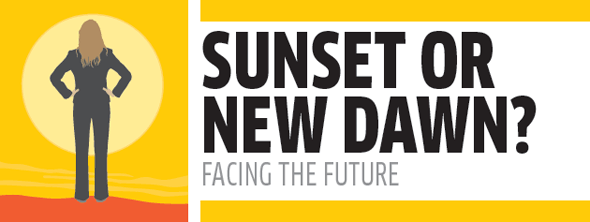
We all face retirement in our own way. Some see it as a gift, while others may think of it as a challenge. The key is to approach retirement with optimism, treating it as an opportunity for new kinds of fulfilment.
R etirement, like going to school for the first time or having your first child, is a major life landmark. As such, youre likely to have to come to terms with two major changes: long periods of free time in which to occupy yourself in a satisfactory way; and feelings of loss regarding the structure and purpose that work provides.
Are you happy and confident about the prospect of retiring, having perhaps found work a burden youre relieved to be free of? Or are you anxious about the change, concerned how youll cope without the career that occupied so much of your waking time? Sometimes people in the lead-up to retirement describe it as carrying an element of uncertainty: with several options available to them, choosing one way over another seems inherently risky. Excitement is a common response, too: the sense of a new life beckoning, of a long-awaited rebalancing, or a freedom from commitment as if a debt had finally been paid off. Youre likely to have complicated feelings about retirement, often with a degree of apprehension. This apprehension may be linked to aging, rather than leaving work, and some doubt will center on the adjustment required to make the best use of a new and very different phase of life.
The quality of your retirement may depend, in part, on your existing circumstances: any unresolved life issues will probably remain difficult, and may be magnified once the distraction of work has gone. It will also depend on your attitude and, in particular, the enthusiasm, energy, and resourcefulness youre able to channel into shaping a new life for yourself. Retirement is a new dawn in the sense that it represents a great opportunity to reinvent or fine-tune your life according to a template of your own making. The best preparation is to reach a level of self-understanding before the big day, and use this as a basis for setting long-term priorities and goals.
Although we all view retirement in individual waysdepending on our personal circumstances, priorities, and personalitiespsychologists have identified three key approaches:
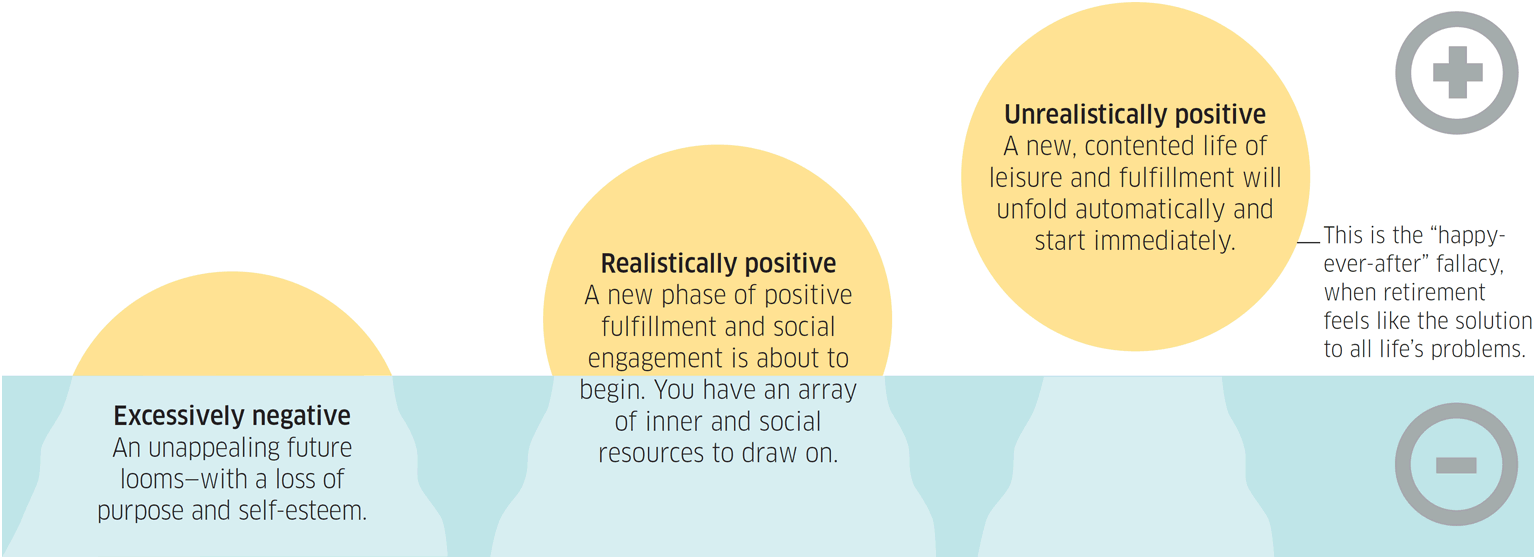
Any or all of the following uncertainties may complicate your attitude to retirement:
How much, if at all, will you miss the following features of work?
Font size:
Interval:
Bookmark:
Similar books «Happy Retirement: The Psychology of Reinvention»
Look at similar books to Happy Retirement: The Psychology of Reinvention. We have selected literature similar in name and meaning in the hope of providing readers with more options to find new, interesting, not yet read works.
Discussion, reviews of the book Happy Retirement: The Psychology of Reinvention and just readers' own opinions. Leave your comments, write what you think about the work, its meaning or the main characters. Specify what exactly you liked and what you didn't like, and why you think so.





